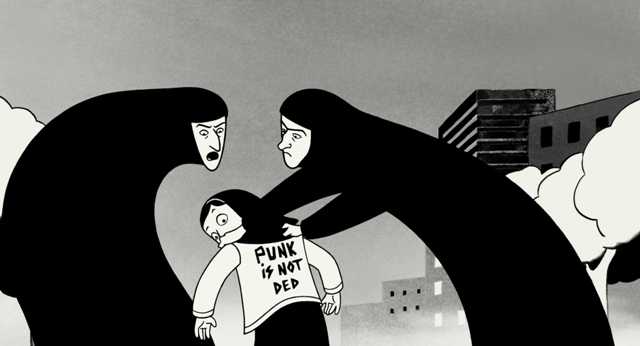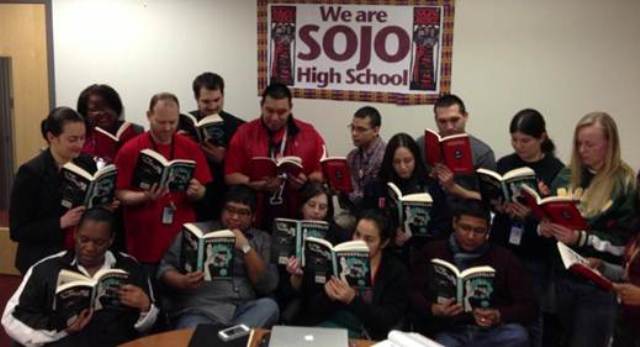'Persepolis' Won't Be Pulled From Chicago Public Schools After All!
By Chuck Sudo in Arts & Entertainment on Mar 15, 2013 8:20PM

A scene from the film version of Persepolis. (Courtesy Sony Pictures Classics)
Normally when we come across stories about banning books in schools it happens in states like Kansas and with science textbooks. We don’t expect it to happen in Chicago Public Schools. Yet Chicago Public Schools CEO Barbara Byrd-Bennett today reversed an earlier order to have schools pull copies of Persepolis, Marjane Satrapi’s autobiographical graphic novel about growing up in Iran during and after the Islamic Revolution, from libraries across the school system. Byrd-Bennett did say the book, which is included in the teaching curriculum for seventh graders, should be reconsidered for students that young. Publishers Weekly spoke with CPS office of teaching and learning chief Annette Gurley who confirmed that, while Byrd-Bennett rescinded the order to have the book pulled from libraries, it would not be returning to classrooms in grades 7-10 for now.
“We want to make sure that the message about inhumanity [is what] kids walk away with, not the images of someone with exposed body parts urinating on someone’s back or someone’s being tortured,” Gurley said, “We are not protesting the value of this book as a work of art. We just want to make sure that when we put this book into the hands of students, they have the background, the maturity to appreciate the book.”“That book will not be back in place as required reading for grades 7-10 until the support is put in place. We want to put the support in place so that the content of this book can be accessed. I don’t think that happens by putting a book on a list and letting people discover it. There needs to be preparation for that,” she added.
In a letter to principals this morning, Byrd-Bennett wrote:
“It was brought to our attention that it contains graphic language and images that are not appropriate for general use in the seventh grade curriculum. If your seventh grade teachers have not yet taught this book, please ask them not to do so and to remove any copies of the book from their classrooms.”
That’s one of the reasons why it’s called a “graphic novel.”
Byrd-Bennett later reversed course after an email from Lane Tech College Prep principal Christopher Dignam was made public instructing copies of the book be removed, per her directive. CPS Spokeswoman Becky Carroll said the school system was not banning Persepolis, but felt it wasn't suitable for middle schoolers or high school freshmen and sophomores, and was working on writing new guidelines so that the book would be included in future teaching curricula.
A Lane Tech student emailed Satrapi of the situation and a protest was scheduled for this afternoon outside the high school. Satrapi told the Tribune the directive by Byrd-Bennett was “shameful” and not what she normally envisioned of Chicago.
Persepolis received universal praise when it was released in 2003, but it has been banned in Iran, the United Arab Emirates and Lebanon for being blasphemous to Islam. and later became an animated film that Roger Ebert called “wondrous.”
Not surprisingly, the books have been embraced by smart teenage girls all over the world, who find much they identify with. Adolescence is fueled by universal desires and emotions, having little to do with government decrees.
The Chicago Teachers Union released a statement tying the decision to remove Persepolis with the ongoing debate to school closures. CTU Financial secretary Kristine Mayle wrote:
"We understand why the district would be afraid of a book like this-- at a time when they are closing schools--because it’s about questioning authority, class structures, racism and gender issues. There’s even a part in the book where they are talking about blocking access to education. So we can see why the school district would be alarmed about students learning about these principles. There’s a lot of merit in Marjane Satrapj’s graphic novel. Not only is it thoughtful, it can be instructive for young people, especially girls. Persepolis can help our students begin to think about the world around them. We hope CPS has not reverted back to the 1950s."
Students at Social Justice High School staged a read-in with the book.

Photo courtesy Chicago Teachers Union